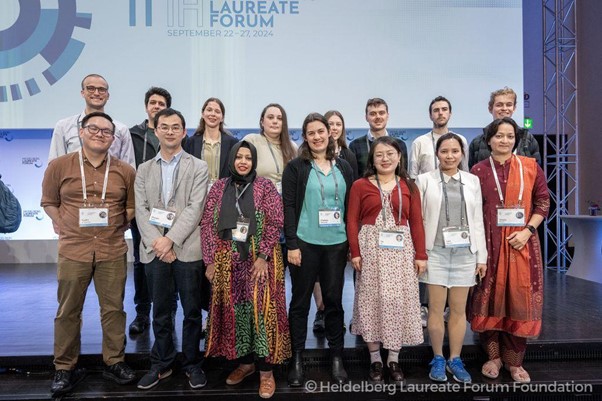Jie Xu
Monash University
11th Heidelberg Laureate Forum Report
Introduction
This report highlights my academic journey as a first-year PhD student in cryptography, my recent experience at the 11th Heidelberg Laureate Forum (HLF), and my current research focus. I aim to present a coherent narrative that not only details my work but also reflects on the inspiration and knowledge I gained from engaging with leading experts in mathematics and computer science at the HLF.
(Figure 1: Group of participants from Australia at the HLF)
Academic Background and Current Position
I completed both my Bachelor’s and Master’s degrees in Mathematics, which provided me with a strong foundation in mathematical theory. Building on this background, I am now pursuing a PhD in cryptography, specifically focusing on problems at the intersection of mathematics and computer science. In addition to my research, I work as a teaching assistant in the Mathematics Department at Monash University, where I have the opportunity to deepen my understanding of mathematical concepts and develop my teaching skills.
Motivation for Attending the Heidelberg Laureate Forum (HLF)
The 11th HLF provided me with a unique opportunity to engage with some of the most distinguished individuals in mathematics and computer science, including Fields Medalists, Abel Prize recipients, and ACM A.M. Turing Award winners. I was honoured to be one of the 200 young researchers selected from over 50 countries to attend this prestigious event. My main motivation for attending the forum was to broaden my academic perspective, interact with experts in my field, and exchange ideas with researchers from diverse disciplines, particularly those related to cryptography and mathematics.
Highlights of the 11th Heidelberg Laureate Forum
The HLF schedule was packed with panel discussions, lectures, and opportunities for informal interactions with laureates. One talk that left a lasting impression on me was by Raj Reddy, recipient of the 1994 ACM A.M. Turing Award. His lecture, titled “The Promise and Perils of AI,” offered a thoughtful exploration of AI’s transformative potential and the ethical challenges it poses. He discussed strategies for leveraging AI to improve human life, while also considering its risks and future implications. This talk reinforced the importance of balancing innovation with ethical responsibility in research.
Beyond the formal talks, the informal settings—such as coffee breaks, lunches, and dinners—provided the chance for more personal interactions with the laureates. These moments allowed me to ask questions, seek advice, and discuss both academic topics and personal experiences with leading researchers. These casual conversations helped me build meaningful connections and provided valuable insights into the human side of academia, emphasizing the importance of perseverance and curiosity in one’s academic career.
(Figure 2:Group photo from the HLF )
(Figure 3: Traditional suits from various countries at the HLF )
Research Focus
My research is centered around lattice-based cryptography, particularly zero-knowledge proofs, a cryptographic protocol that allows one party to prove to another that a statement is true without revealing additional information. I am currently working on the development of oblivious pseudorandom functions, which have important applications in privacy-preserving cryptographic protocols. This area of research has the potential to strengthen security in a variety of digital systems, particularly as concerns about privacy and data security continue to grow.
Applications of My Research
The real-world applications of my research are one of the most exciting aspects of my work. I am particularly interested in how lattice-based cryptography can be applied to cloud computing and privacy-enhancing technologies. As digital systems become more integral to our daily lives, ensuring their security is paramount. My research could contribute to the development of more secure, privacy-preserving cryptographic protocols that address vulnerabilities in cloud computing, as well as support broader efforts to protect personal data and digital privacy.
Admired Academic Figure
If I could meet any Fields Medalist or Abel Prize winner, I would choose Yael Tauman Kalai, a prominent researcher in cryptography and complexity theory. I am inspired by her ability to balance a rigorous academic career with her personal life. Her work in cryptography and her contributions to the field have made a lasting impact, and I would love the opportunity to learn from her experiences and gain insights into how she navigates the challenges of academic life.
(Figure 4:Photo with Yael Tauman Kalai, recipient of the ACM Computing Prize )
Conclusion
In conclusion, this report outlines my academic journey and the key aspects of my research, alongside my enriching experience at the 11th Heidelberg Laureate Forum. The forum provided invaluable opportunities to engage with world-renowned experts and expand my academic perspective. As I continue my PhD journey, I am excited to contribute to the growing field of cryptography, with a particular focus on improving the security and privacy of digital systems. I look forward to building on the knowledge and connections gained at the HLF and to furthering my research in lattice-based cryptography and its applications.




